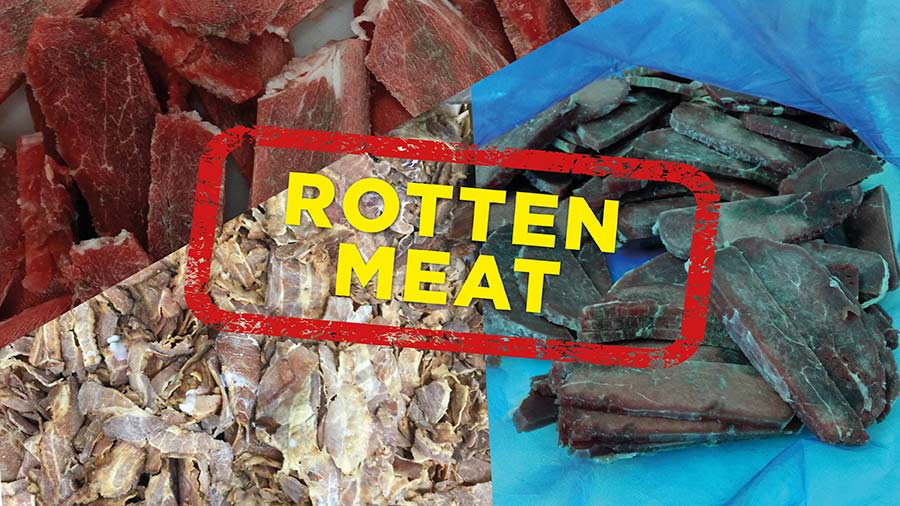Farmers Weekly campaign seeks to unite meat sector
 These images were supplied to Farmers Weekly by a previous employee of the food processor under investigation.
These images were supplied to Farmers Weekly by a previous employee of the food processor under investigation. Farmers Weekly is seeking the support of organisations from across the food supply chain, to help stamp out criminality in the meat sector.
Our planned campaign comes on the back of our exclusive investigation into long-standing, industrial-scale food fraud and food safety breaches at a large processor, which cannot be named for legal reasons.
See also: Mass food fraud and safety scandal engulfs sector
The article caused a national storm and was picked up by all the major print titles and broadcasters, including ITV, Sky News and the BBC, which described it as the “most significant investigation since the horsemeat scandal”.
Now, Farmers Weekly wants to take action to protect the integrity of the meat supply chain through a new campaign – Meat: Our Expectations.
We want to bring together farmers, farming unions, meat processors, retailers, consumers and regulators to create a Charter For Change, building on the four recommendations we set out in last week’s issue (see “Farmers Weekly Recommendations”).
Support
A spokesperson from the Association of Independent Meat Suppliers (Aims) welcomed Farmers Weekly’s investigation, adding: “We are happy to support their proposed manifesto, with its objectives to restore trust at every stage of the supply chain.”
Consumer watchdog Which? also expressed an interest in the campaign, saying it was “incredible” that the FW investigation had revealed serious failings in the meat sector 10 years on from horsegate.
Sue Davies, head of food policy, said: “The Food Standards Agency [FSA] and Food Standards Scotland need to step up their efforts to prevent food crime and give consumers greater assurance that they can trust the meat they buy.”
The campaign comes after FSA chief executive Emily Miles told the BBC Today programme it was possible people had been put at risk from contaminated meat in the past.
She agreed that the Farmers Weekly campaign “identified a number of areas for potential change” and looked forward to hearing more.
“The FSA is always interested in improvements that mean food businesses meet their legal responsibilities to provide safe and authentic food,” she said.
Pressure
The FSA and National Food Crime Unit are under pressure to act on intelligence that others in the supply chain are behaving in dishonest ways.
Norman Bagley, Aims head of policy, called on senior management at both organisations to consider their positions, claiming they had “failed to protect the public and honest companies from the risks to human health and fraud”.
Meanwhile, top food crime expert, Chris Elliott, warned the scandal was “more worrying” than horsegate.
Speaking to Times Radio, Prof Elliott said there were “major issues that really need to be addressed”, adding that the whole industry around audits and inspections was “not worth the money people spend on it”.
Meanwhile, Defra secretary Therese Coffey has committed to consider bringing the FSA under Defra’s remit.
Ministers from the department were asked about their response to the Farmers Weekly investigation during Defra questions in the House of Commons on 30 March.
Sir Robert Goodwill, chairman of the Environment, Food and Rural Affairs select committee, said it was clear the FSA had been “misled and hoodwinked” by fraudulent operators.
“Is there a case to bring the FSA within Defra, rather than in the Department for Health and Social Care?” he asked.
Ms Coffey said the idea was “of interest”.
“I will consider that in line with the prime minister,” she said.
Farmers Weekly recommendations
In the wake of the meat fraud scandal, we want to establish a Charter For Change.
We believe this should include the following steps, to be taken within the meat supply chain to ensure standards RISE:
- Reportable: Establish an independent, short-number whistleblowing line and make it a requirement for this to be clearly displayed in factories, alongside accompanying information in multiple languages.
- Independent: Ensure an independent body can verify how much British meat is going in and out of factories – known as the mass balance – so that dilution can be identified more easily.
- Swift: Address the 15-minute gap between auditors signing into a premises and entering the factory floor.
- Electronic: Make digital record-keeping mandatory.
We are, however, keen to hear other views – from farmers, processors, traders and retailers.
Please share your ideas on what measures the industry should take to clamp down on food fraud by emailing us at farmersweekly@markallengroup.com.
